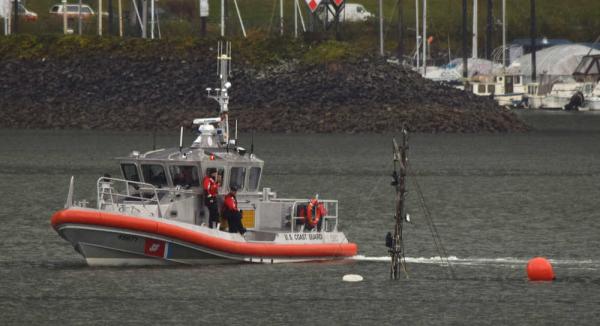Alaska has a big problem beneath the surface.
For Juneau, that problem has been breaking the surface a lot recently. It’s the issue of derelict and abandoned boats. Right now, there’s not much anyone can do about it.
Last month, the 96-foot tugboat Challenger sank in Gastineau Channel. At the right low tide, you can still see the top of its pilothouse peeking from the water up-channel of the Juneau-Douglas Bridge. Even at high tide, the bright orange containment boom ringing the wreck is a clear sign that something wrong happened there.
Under the press of wind, wave and tide, the wreck of the Challenger is beginning to come apart. Debris is washing up on beaches and in harbors throughout the channel.
We’ve seen Facebook posts and letters in this newspaper asking the city, the state and the Coast Guard to simply do something and fix the problem. Unfortunately, our state’s regulations and budget don’t cover situations like these.
The boat’s owner is supposed to be liable for cleaning up the wreck, but what do you do when they don’t have insurance and can’t pay the bill?
Unlike cars, boats don’t have to carry insurance.
We’ve been told that removing a boat as big as the Challenger from Gastineau Channel will cost hundreds of thousands of dollars. It’s not quite the cost of tearing down the Gastineau Apartments, but a solution here is no easier than tearing down that eyesore.
It’s going to be difficult for the state to even hold the Challenger’s owner accountable. Recreational boats must be registered with the Department of Motor Vehicles, but the Challenger was originally a working boat. It didn’t have to be registered with the DMV. It also wasn’t registered with Fish and Game, since it wasn’t a fishing boat.
That means that even though Juneauites know it was owned by Douglas artist R.D. Robinson, it’s going to be difficult for the state to find legally binding documentation that Mr. Robinson is the owner.
Even if the state can tie Mr. Robinson to the Challenger, it doesn’t have a way to force him to pay — barring a lengthy court case.
There is no designated fund to clean up wrecked and derelict vessels in Alaska. There is a federal fund for cleaning up oil spills, but none for solid garbage, which the Challenger has become.
The Alaska Department of Natural Resources — now overseeing the Challenger because it litters the state land at the bottom of the channel — lacks even the authority to fine Mr. Robinson for littering.
In places like Bethel, which has a dumping ground called Steamboat Slough, the problem of derelict and abandoned boats long ago broke the surface of public awareness.
In Juneau, we’re just starting to see this issue for the critical problem it is. Every day that goes by, we’re seeing more evidence wash up. With every fouled prop and hull dinged by debris, we’re seeing more need for action.
The state of Washington offers one path forward. In 2002, it began charging a $3 surcharge on recreational boat registration and $5 for visiting vessels. A surcharge on commercial vessels was added in January. Money from those surcharges is going to pay for the removal of abandoned boats and barges in Washington state. It’s not enough to pay for everything, but it’s a start, and Alaska should look along similar lines.
If that approach isn’t palatable to Alaskans, we could instead simply mandate the registration of all boats — commercial and recreational alike — through the DMV. We could also mandate that boats of a certain size, like all cars, carry insurance sufficient to cover their salvage.
At the very least, we could grant the Department of Natural Resources the simple authority to levy fines on those who pollute Alaska’s waters.
What’s unfortunate is that further regulation is even necessary. We would like to believe that Alaskans have the wherewithal and brotherhood to avoid contaminating the commons with their foolhardiness. Unfortunately, as the Challenger has shown, we can’t always count on good sense to triumph.
Rep. Paul Seaton, a Republican from Homer, has long supported measures to address abandoned and derelict vessels. Now that the problem has broken the surface of Juneau’s consciousness, we hope other lawmakers will see the clear need to address this problem through strong action.

